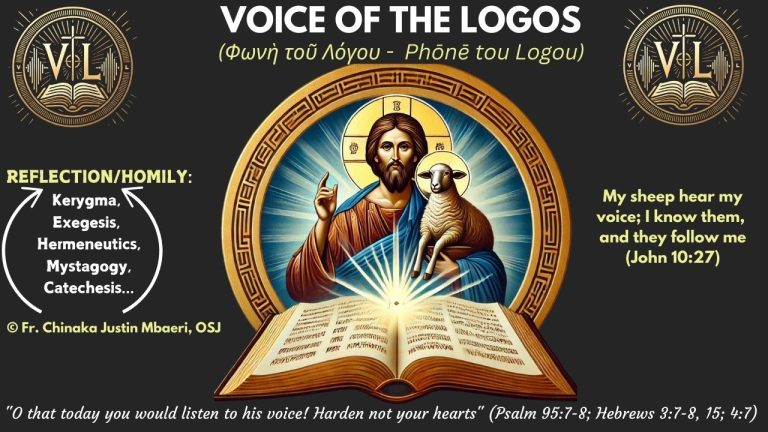How Can We Preach Christ in a Culture Addicted to Entertainment and Spectacle?
First Reading: Acts 8:1-8
Responsorial Psalm: Ps. 65(66):1-7
Gospel: John6:35-40
________________________________________
Many people today are glued to their screens, moving from one video to the next, craving new sensations, trends, and digital stimulation. Whether it’s social media reels, entertainment shows, comedy skits, or even religious content, the dominant culture constantly feeds on emotional highs and sensory novelty. In this environment, it becomes increasingly difficult to distinguish between authentic spiritual experiences and performative religion. The temptation to reduce the proclamation of the Gospel to a kind of entertainment is strong. Many pastors and evangelizers find themselves subtly adapting their preaching styles or pastoral approaches in ways that prioritize popularity, applause, and emotional responses over truth and conversion. This culture, driven by spectacle and crowd-pleasing performances, is not new. In fact, the biblical readings for today present us with a powerful lens to evaluate how we must preach Christ amidst such distraction-driven societies.
In the First Reading (Acts 8:1b-8), we find the early Church scattered because of a great persecution that broke out after Stephen’s martyrdom. The “Sitz im Leben” of this passage is one of survival, displacement, and reorientation. Christians, especially the Hellenists, were being forced out of Jerusalem, and this unplanned missionary expansion led Philip to preach in Samaria. The Samaritans were traditionally at odds with the Jews, both theologically and politically. Yet Philip’s preaching was accompanied by signs and healings, leading to great joy in the city. The Greek verb used here for preaching is kēryssō, which implies a bold public proclamation, not entertainment or persuasion through theatrics. The signs followed the word; they were not the focus. This distinction is crucial. The power of the Gospel transformed a hostile territory not because it mimicked cultural expectations, but because it revealed the Kingdom of God breaking in. In a society addicted to spectacle, it is easy to confuse the miraculous with the manipulative, and mistake conviction for crowd control. Philip’s ministry invites us to re-evaluate whether our current approaches are helping people to encounter Christ or simply to feel good momentarily.
The responsorial psalm, Psalm 66, continues the theme of divine power manifested in real history. The psalmist exhorts the people to “Shout joyfully to God, all the earth,” and then recounts the memory of Israel’s deliverance: “He turned the sea into dry land.” This is not entertainment; it is a liturgical memory rooted in lived experience. The psalm is a form of zikkaron, a memorialization of God’s deeds that transcends time, drawing the worshipper into God’s saving action. In contrast to shallow spectacle, this is communal catechesis and worship. The joy that the psalm speaks of is not emotional hype but a response to God’s intervention in the life of His people. Today, we are challenged to ask whether our liturgies, youth events, and public worship maintain this kind of memory. Is God the center, or have we substituted Him with spectacle? The psalm shows that real praise arises from awe, gratitude, and recognition of divine fidelity, not from a desire to consume more religious excitement.
In the Gospel reading from John 6:35-40, Jesus boldly declares, “I am the Bread of Life.” The Sitz im Leben here is post-feeding of the five thousand, where the crowds are still seeking Jesus but for the wrong reasons. They had just witnessed a miracle and were following Him with the hope of more signs. But Jesus shifts the conversation from physical satisfaction to a call for deeper faith. The Greek word used for “see” in “you have seen me and yet do not believe” is horaō, which implies not just physical sight but perception and recognition. The crowd had witnessed the miracle but failed to perceive its meaning. They wanted more signs, more spectacle, more performance. Jesus redirects them to believe in Him as the true sustenance, the one sent by the Father. His words challenge the modern Church to move beyond the craving for spiritual entertainment and toward a Eucharistic faith that is constant, silent, and sacrificial. In this context, preaching Christ is not about impressing the audience but about inviting them into communion.
From all these readings, a number of urgent and practical lessons emerge. First, evangelization must be rooted in truth, not in trends. Ministers of the Word must resist the temptation to prioritize applause or followers over conversion and clarity. Are our homilies, parish events, liturgies, and even social media strategies rooted in Christ, or are they attempts to compete with the world’s entertainment industry? Second, the liturgical and communal life of the Church must lay emphasis on memory and sacrament over sensation. Real joy comes not from fleeting emotions but from living in the reality of God’s saving acts. Third, the Gospel must be presented as a Person to encounter, not an experience to consume. If Christ is truly the Bread of Life, then preaching must lead people into a life of discipleship, not a cycle of dependency on charismatic highs. The bread of life is not sweet cake but sustaining food; Christ does not promise a show, He promises Himself. The task is clear: preach Christ not as a magician but as Messiah. Form communities that do not just feel good but grow deep. And raise up disciples who know how to recognize God not only in signs and wonders, but also in the breaking of bread. Lastly, in a culture addicted to spectacle, we must form mature Christians who can see beyond appearances and recognize the hidden Christ present in Word and Sacrament, in silence and service, and in the ordinary rhythms of Christian life.
O that today you would listen to his VOICE, harden not your hearts! (Ps. 95:7)
____________________________
Shalom!
© Fr. Chinaka Justin Mbaeri, OSJ
Seminário Padre Pedro Magnone, São Paulo, Brazil
nozickcjoe@gmail.com / fadacjay@gmail.com
__________________________
Have you prayed your rosary today?


